Did you know 1 in 3 people with psoriasis face double the risk of heart disease? This link shows how inflammation connects these conditions. The right foods can help. Discover the best anti-inflammatory foods for psoriasis and heart health to reduce flare-ups and protect your heart.
Millions manage psoriasis while worrying about heart risks. The anti-inflammatory diet for psoriasis isn’t just about skin—it’s a lifeline for your heart too. This guide breaks down how foods like salmon, berries, and olive oil fight inflammation at its source.
Explore the heart healthy diet for psoriasis that’s easy to follow. Learn which spices like turmeric boost healing and which foods to avoid. Every bite can be a step toward clearer skin and a stronger heart.
- Section 1: Introduction to best anti-inflammatory foods
- Section 2: Inflammation’s role in psoriasis and heart disease
- Section 3: How diet impacts psoriasis symptoms
- Section 4: Heart risks linked to psoriasis explained
- Section 5: Top 10 foods to prioritize
- Section 6: The Mediterranean diet blueprint
- Section 7: Spices and supplements for extra support
- Section 8: Foods to avoid for better outcomes
- Section 9: Meal planning made simple
- Section 10: Quick, inflammation-fighting recipes
- Section 11: Exercise and lifestyle tips
- Section 12: Partnering with doctors
- Section 13: Final steps to take control
Key Takeaways
- Inflammation drives psoriasis and heart disease—food can fight both.
- The best anti-inflammatory foods for psoriasis and heart health include omega-3s and antioxidants.
- A heart healthy diet for psoriasis reduces flare-ups and lowers heart risks.
- Simple swaps like olive oil or berries make a big difference.
- Science-backed strategies are easy to follow at home.
Understanding the Connection Between Inflammation, Psoriasis, and Heart Health
Inflammation is a big problem for both psoriasis and heart disease. It weakens skin cells and blood vessels. Eating the right foods can help manage these issues and improve overall health.
How Chronic Inflammation Affects Both Conditions
Psoriasis starts with an overactive immune system that inflames the skin. This inflammation can also harm blood vessels, increasing heart disease risk. People with psoriasis are more likely to have heart problems, making diet very important.
“Anti-inflammatory diets reduce markers like CRP, linking to lower flare-ups and better cardiovascular outcomes.” – Dr. Emily Carter, Dermatology Research Institute
The Science Behind Anti-Inflammatory Diets
Foods like fatty fish and leafy greens have omega-3s and antioxidants. These nutrients fight inflammation, slowing skin cell growth and protecting arteries. Research shows these diets can lower disease markers by up to 30%.
Why Managing Inflammation Matters for Dual Health Concerns
Heart-healthy eating tips include eating less red meat and processed foods. Instead, focus on whole grains and fruits. Making small changes in your diet can lead to big improvements in skin health and heart health over time.
The Powerful Impact of Diet on Psoriasis Symptoms
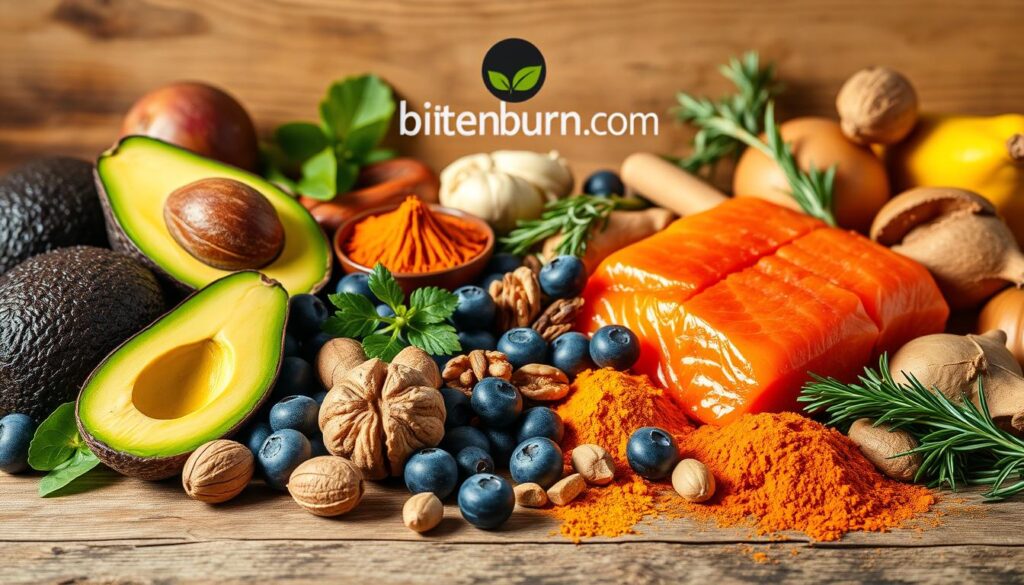
Eating the right foods can change how psoriasis affects your life. The anti inflammatory diet for psoriasis uses natural remedies to reduce redness and itching. Studies show that cutting down on inflammatory foods helps slow skin cell growth, which can lead to flare-ups.
“Switching to anti-inflammatory foods cut my outbreaks in half within months,” says Mark T., a psoriasis patient who adopted this lifestyle change. His story reflects research linking omega-3s and antioxidants to improved skin health.
Key ingredients like fatty fish, leafy greens, and berries are beneficial. They lower inflammation markers like CRP and support heart health. These best anti inflammatory foods for psoriasis and heart health help balance immune responses that drive both conditions. Turmeric and ginger add extra anti-inflammatory power without medication.
Nutritionists suggest making small changes in your diet. Swap processed snacks for walnuts or cherry tomatoes. Even small changes can make a big difference. Always talk to your doctor before making dietary changes to get the best results.
Heart Health Concerns for People Living with Psoriasis
Psoriasis is more than just skin issues. People with psoriasis are at a 20% higher risk of heart disease and stroke. This is because psoriasis and heart disease share inflammation pathways. Doctors say that long-term inflammation from psoriasis can harm blood vessels, putting extra strain on the heart.
Understanding the Increased Cardiovascular Risk
Even mild psoriasis can increase heart disease risk, studies show. The body’s constant fight against inflammation can damage arteries. This leads to higher blood pressure and cholesterol levels. Eating a heart healthy diet for psoriasis can help prevent this.
How Anti-Inflammatory Foods Support Heart Function
Choosing the best anti inflammatory foods for psoriasis and heart health can lower risks. Foods like salmon, walnuts, and spinach:
- Reduce artery-clogging LDL cholesterol
- Boost nitric oxide to relax blood vessels
- Curb oxidative stress linked to hypertension
Omega-3s in fatty fish, for example, can lower triglycerides—a key heart health marker. Even small changes, like using olive oil instead of butter, can make a difference.
Markers of Inflammation That Affect Heart Health
Inflammation shows up in blood tests. High C-reactive protein (CRP) or homocysteine levels signal heart risks. Eating foods that improve heart health can lower these markers. Turmeric’s curcumin, for example, can reduce CRP levels by 30% in studies. Monitoring these levels with a doctor shows progress in heart and skin health.
“A proactive diet isn’t just for symptoms—it’s prevention,” says Dr. Emily Chen, a dermatologist specializing in psoriasis care.
Today’s nutrition choices can shape a better tomorrow. Choosing anti-inflammatory foods is not just for the skin. It’s a way to heal the whole body.
Top 10 Best Anti-Inflammatory Foods for Psoriasis and Heart Health
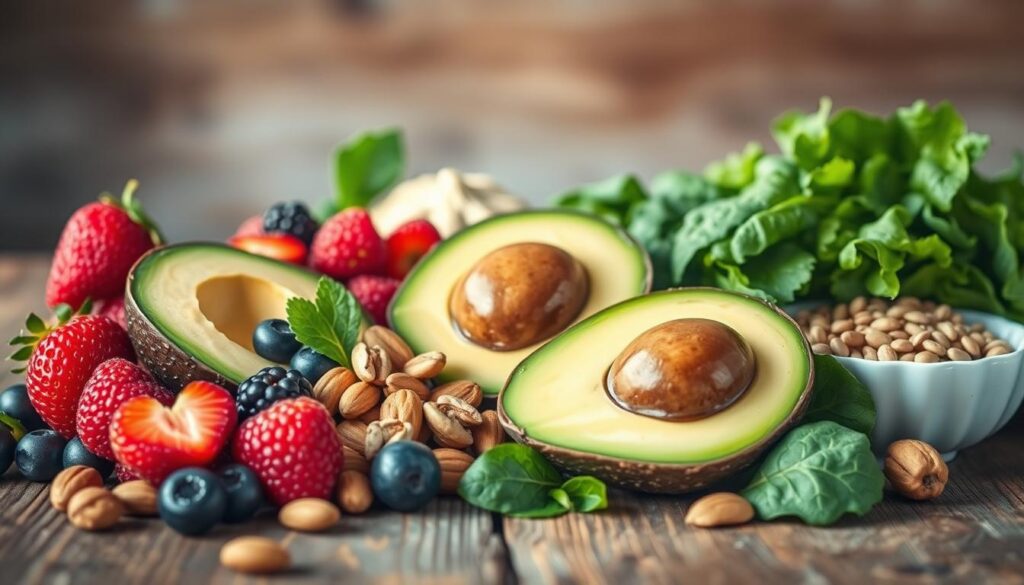
Choosing the right foods can make a big difference in managing inflammation and supporting overall wellness. The best anti-inflammatory foods for psoriasis and heart health provide nutrients that reduce swelling and protect both skin and cardiovascular systems. These top foods for reducing inflammation offer natural solutions to improve well-being. Let’s explore the best choices to add to your plate.
Fatty Fish Rich in Omega-3s
Salmon, mackerel, and sardines are great for foods to improve heart health. They have omega-3 fatty acids that lower cytokines linked to psoriasis flares and heart strain. Aim for 2 weekly servings to boost skin clarity and heart function.
- Salmon: High in EPA/DHA for joint and heart support
- Mackerel: Contains vitamin D to aid skin healing
- Sardines: Affordable and loaded with anti-inflammatory fats
Colorful Berries and Their Antioxidant Properties
Blueberries, strawberries, and cherries are top foods for reducing inflammation. Their antioxidants fight oxidative stress and calm psoriasis triggers. Sprinkle on oatmeal or blend into smoothies for daily benefits.
- Blueberries: Anthocyanins neutralize free radicals
- Strawberries: Vitamin C strengthens immunity
- Cherries: Natural compounds reduce joint inflammation
Leafy Greens and Cruciferous Vegetables
Kale, spinach, and broccoli are nutrient powerhouses. Their vitamins A, C, and E fight skin inflammation while supporting heart health. Add to salads or stir-fries for maximum impact.
- Kale: Fiber and antioxidants for skin repair
- Spinach: Iron and folate for circulation and skin tone
- Brussels sprouts: Sulforaphane combats oxidative damage
Heart-Healthy Nuts and Seeds
Walnuts, flaxseeds, and chia seeds provide omega-3s and fiber. Walnuts supply ALA, a plant-based omega-3, while chia seeds stabilize blood sugar levels. Sprinkle on yogurt or mix into baked goods for easy inclusion.
- Walnuts: ALA omega-3s for heart protection
- Flaxseeds: Lignans and fiber for digestion
- Chia seeds: Packed with protein and omega-3s
Olive Oil and Other Beneficial Fats
Swap butter for olive oil to cut inflammation. Its monounsaturated fats lower bad cholesterol and ease arterial stress. Drizzle over veggies or use in dressings for a flavorful upgrade.
- Olive oil: Polyphenols reduce heart disease risk
- Avocado oil: High smoke point for cooking
The Mediterranean Diet: A Blueprint for Managing Inflammation
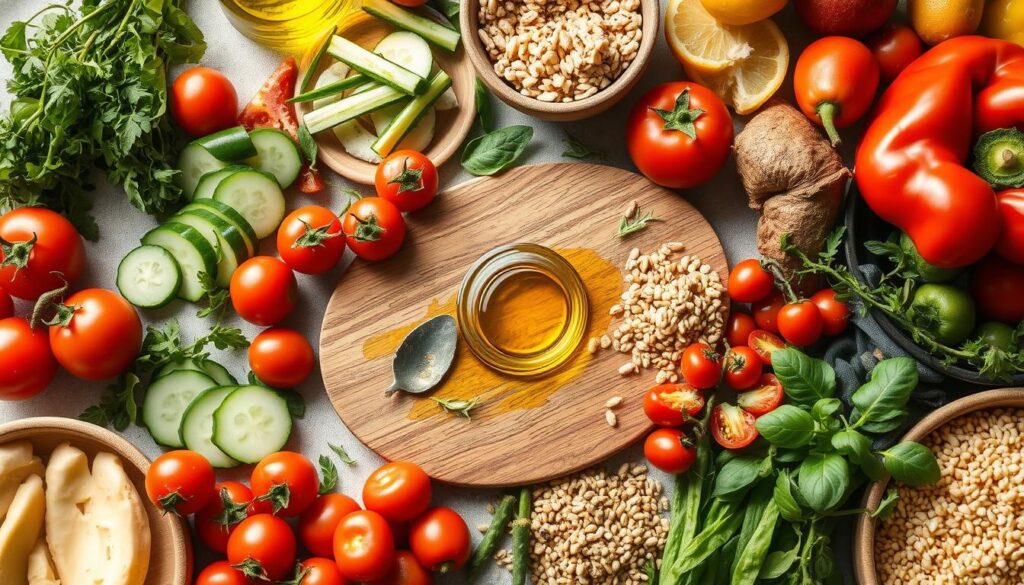
Adopting the anti inflammatory diet for psoriasis doesn’t mean you have to give up taste. The Mediterranean diet is a mix of heart-healthy and anti-inflammatory foods. It’s both tasty and good for you. This diet is based on old traditions that focus on foods that fight inflammation.
- Fresh vegetables and fruits as daily staples
- Olive oil as the primary fat source
- Lean proteins like fish, beans, and nuts
- Whole grains over refined carbohydrates
- Spices like oregano and garlic instead of salt
Studies from Harvard T.H. Chan School of Public Health show this diet lowers CRP, a sign of inflammation. For those with psoriasis, following this diet can lead to fewer skin flare-ups. Here’s how to make it work for today’s busy lives:
| Traditional | Modern Adaptation |
|---|---|
| Lamb or goat cheese | Plant-based alternatives like tofu or cashews |
| Olive tapenade | Guacamole with whole-grain tortillas |
| Grilled fish weekly | Canned wild-caught salmon for quick meals |
Adding small changes like eating with family and being mindful can help. These steps make the diet easy to follow and support your health without feeling like you’re missing out.
Turmeric, Ginger, and Other Anti-Inflammatory Spices
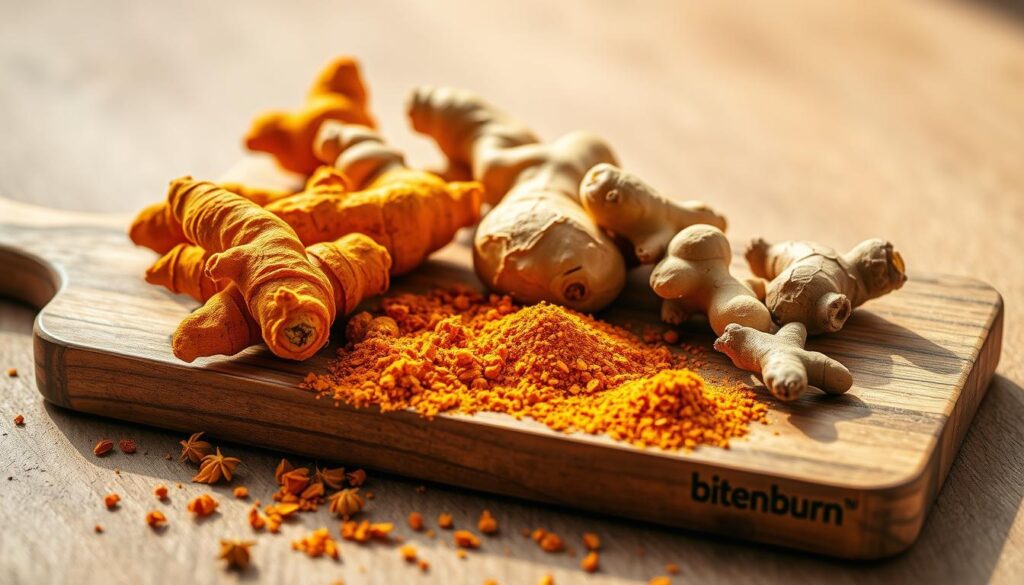
Spices like turmeric and ginger are natural remedies for psoriasis and heart health. They have strong anti-inflammatory powers. Turmeric’s curcumin and ginger’s gingerol help fight inflammation in both conditions. Adding these inflammation-fighting foods to your meals can help your body fight off inflammation without harsh drugs.
Start by sprinkling turmeric in soups or smoothies—pair it with black pepper to enhance absorption. Try grating fresh ginger into teas or stir-fries. Here’s how to maximize their benefits:
- Use ground turmeric in scrambled eggs or rice dishes.
- Sip ginger tea with lemon for morning energy.
- Add garlic and cinnamon to oatmeal or yogurt.
- Season salads with cayenne or paprika for a spicy kick.
When diet alone isn’t enough, supplements can fill gaps. Look for turmeric extracts with 95% curcumin or ginger capsules. Always check with a doctor, specially if on blood thinners or medications. Quality matters—choose brands tested for purity. Supplements should complement—not replace—the best anti inflammatory foods for psoriasis and heart health already in your meals.
These spices aren’t just flavor boosters—they’re part of a holistic approach to managing inflammation. Experiment with recipes and talk to your healthcare provider about safe supplement options.
Foods to Limit or Avoid That May Trigger Inflammation

Starting a heart healthy diet for psoriasis means knowing what to avoid. Some foods can make inflammation worse, affecting both skin and heart health. Here’s how to spot and cut down on these triggers.
Common Food Triggers for Psoriasis Flares
Gluten, dairy, and nightshade veggies like tomatoes or peppers can trigger psoriasis in some. Alcohol, too much of it, can increase inflammation. Keep a food diary to find out what triggers your symptoms.
- Gluten-containing grains (wheat, barley)
- Dairy products (milk, cheese)
- Nightshade vegetables (tomatoes, peppers)
- Alcoholic beverages
Inflammatory Foods That Impact Cardiovascular Health
Processed meats, fried foods, and sugary snacks with trans fats or refined carbs are bad for skin and heart. Too much sodium can raise blood pressure, adding to psoriasis risks. Opt for the best anti inflammatory foods for psoriasis and heart health instead.
- Trans fats (margarine, fried foods)
- Processed meats (sausages, bacon)
- Refined sugars (sodas, candy)
- High-sodium items (canned soups, chips)
Hidden Sources of Inflammatory Ingredients
Be careful of additives like vegetable oils (soybean, canola) in snacks or salad dressings. Even “low-fat” foods might have inflammatory additives. Always check labels for ingredients like high-fructose corn syrup or hydrogenated oils.
Small changes can help a lot. Choose whole foods and focus on anti-inflammatory foods. Your skin and heart will appreciate it!
Creating a Practical Meal Plan for Anti-Inflammatory Eating
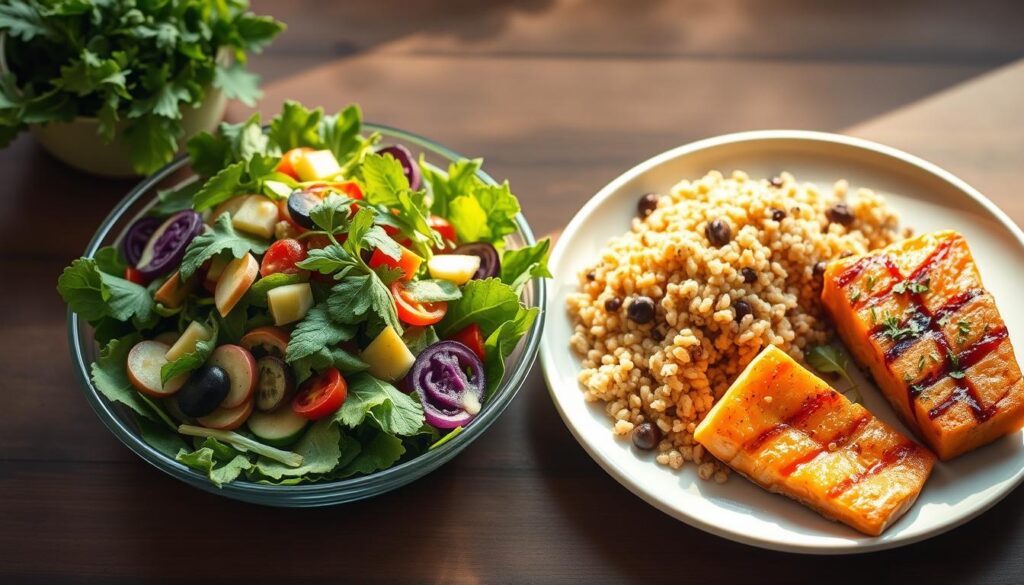
Start by making a detailed anti inflammatory diet for psoriasis plan. Plan your meals for the week using the best anti inflammatory foods for psoriasis and heart health. Choose fresh foods like wild-caught salmon, leafy greens, and berries.
| Meal | Food Ideas | Benefits |
|---|---|---|
| Breakfast | Oatmeal with walnuts & blueberries | Omega-3s + antioxidants |
| Lunch | Grilled chicken salad with olive oil dressing | Lean protein + anti-inflammatory fats |
| Dinner | Salmon with roasted broccoli | Omega-3 rich + fiber boost |
| Snack | Edamame or apple slices with almond butter | Plant-based protein + healthy fats |
- Batch-cook grains like quinoa or farro for quick meals
- Freeze prepped veggies for stir-fries and soups
- Opt for frozen berries or canned salmon to save money
Also, follow heart-healthy eating tips like using olive oil instead of butter. Swap sugary snacks for nuts. Eat ½ plate of veggies at meals. Meal prepping on Sundays can save you 50% of prep time. Start with one change a day to see big improvements!
Simple and Delicious Anti-Inflammatory Recipes
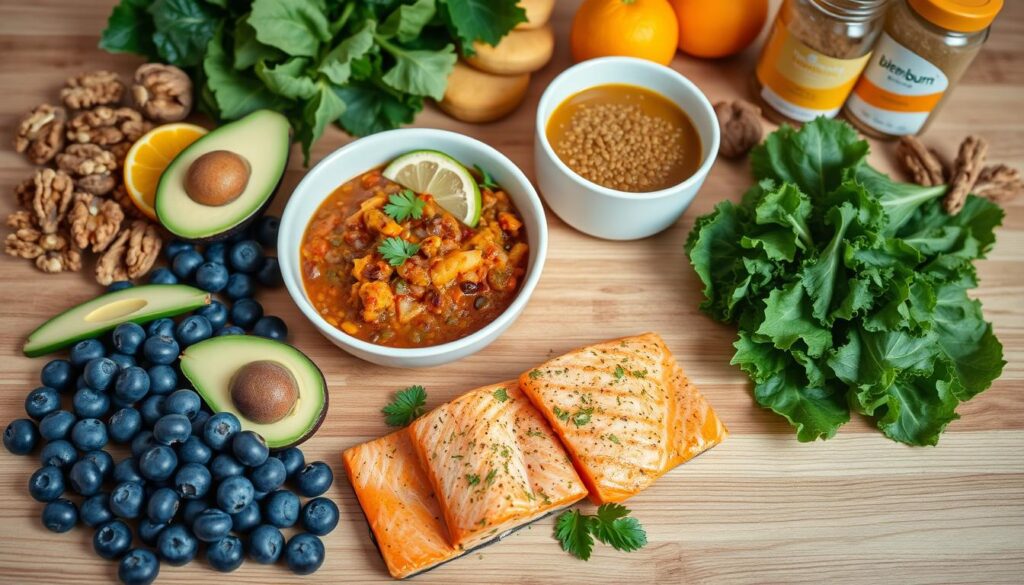
Enjoy meals that nourish your body and taste great. These recipes use the best anti-inflammatory foods for psoriasis and heart health. They make it easy to prioritize your well-being without sacrificing flavor.
Breakfast Options That Fight Inflammation
- Overnight Oats with Berries & Flaxseed: Mix oats, almond milk, flaxseed, and frozen berries. Refrigerate overnight. Top with walnuts for crunch. Ready in 5 minutes, gluten-free.
- Turmeric Smoothie Bowl: Blend spinach, pineapple, almond milk, and turmeric. Top with mango and sunflower seeds. A 10-minute breakfast packed with anti-inflammatory power.
Anti-Inflammatory Lunch and Dinner Ideas
Try these easy dishes filled with top foods for reducing inflammation:
- Grilled Salmon with Quinoa: Season salmon with lemon and dill. Serve with quinoa and roasted asparagus. Omega-3-rich and ready in 25 minutes.
- Mediterranean Chickpea Bowl: Layer chickpeas, cucumbers, tomatoes, and olives over greens. Drizzle with tahini dressing. Full of fiber and heart-healthy fats.
Snacks and Desserts That Won’t Trigger Flares
Indulge in treats that align with a heart healthy diet for psoriasis:
- Dark Chocolate & Nut Mix: Combine 70%+ dark chocolate, almonds, and goji berries. A sweet, antioxidant-rich snack.
- Chia Seed Pudding: Soak chia seeds in coconut milk, sweeten with maple syrup. Top with mango. Ready in 5 minutes, vegan-friendly.
These recipes prove eating for health can be fun and satisfying. Experiment with these ideas to build meals that fuel your body and soul.
Lifestyle Factors That Complement an Anti-Inflammatory Diet
Starting with the best anti-inflammatory foods for psoriasis and heart health is a good first step. But, adding mindful habits can make a big difference. Simple actions like moving more, managing stress, and sleeping better can help psoriasis and heart health.
- Move Daily: Try to walk, swim, or do yoga for 30 minutes most days. Exercise helps lower inflammation and improves your skin and heart.
- Manage Stress: Use deep breathing or meditation to reduce stress. Stress hormones like cortisol can make psoriasis worse and increase heart risks.
- Sleep Smart: Aim for 7–8 hours of sleep each night. Poor sleep can increase inflammation markers like CRP, which are linked to both conditions.
- Hydrate: Drinking water helps flush out toxins and keeps your skin moist. Adding lemon to your water can give you an extra anti-inflammatory boost.
- Sun Sensibly: Spend 10–15 minutes in the morning sun to boost vitamin D production, which helps with psoriasis. Just avoid getting sunburned in the middle of the day.
| Habits to Avoid | Better Choices |
|---|---|
| Smoking | Quit with support programs |
| Excessive alcohol | Limit to 1 drink/day (women) or 2 (men) |
By combining these habits with heart-healthy eating tips, you create a complete wellness plan. Small changes in your daily life can turn meals and habits into powerful tools for long-term health. Your body—and skin—will surely appreciate it!
Working with Healthcare Providers to Optimize Your Diet
Starting an anti inflammatory diet for psoriasis and foods to improve heart health is easier with expert help. Talk to your dermatologist, cardiologist, or primary care doctor about your diet goals. They can see how the best anti inflammatory foods for psoriasis and heart health fit with your treatment.
- Ask your doctor to recommend a registered dietitian specializing in chronic conditions or cardiovascular nutrition.
- Discuss lab tests like CRP (a marker of inflammation) to monitor heart and psoriasis progress.
- Share meal plans or recipes to ensure they align with your health goals.
Healthcare teams can help balance your diet with medications. For example, a dietitian might adjust your anti inflammatory diet for psoriasis to avoid drug interactions. Keep track of symptom changes and blood pressure to show your doctor how diet changes affect you.
Look for certified experts through the American Heart Association or the Academy of Nutrition and Dietetics. They can help you find practitioners who know about psoriasis and heart health.
Regular meetings with your team are key to making safe choices. Small changes, like adding omega-3-rich fish or cutting down on processed foods, are best with their guidance. Your healthcare providers are your partners in creating a diet plan that’s right for you.
Conclusion: Empowering Your Health Journey Through Anti-Inflammatory Nutrition
Choosing the right foods is a big step towards feeling better. Focus on foods that fight inflammation like fatty fish, berries, and leafy greens. These can help reduce psoriasis flare-ups and improve heart health.
Small changes can add up over time. Try swapping inflammatory snacks for nuts or adding turmeric to your meals. This can make a big difference.
Remember, everyone is different, and psoriasis triggers vary. Keep track of how foods affect your skin and energy. Start by cutting back on processed sugars, fried foods, and alcohol.
These are common foods to avoid with psoriasis. Add regular exercise and stress management for even more benefits.
Always talk to your healthcare team to make changes that fit you. Even small steps towards anti-inflammatory eating can help your skin and heart. Celebrate every small win, not just the big ones.
Start with one change today, like using olive oil instead of butter or adding berries to your breakfast. Over time, these small steps can become lasting habits that nourish your body.


[…] you know that over 8 million people in the United States live with psoriasis? This chronic inflammatory disease is often misunderstood as just a skin condition. However, it goes much deeper, affecting the […]
[…] is a long-term autoimmune disease. It causes skin cells to grow too fast, leading to scaling, inflammation, and redness. The Journal of the American Academy of Dermatology lists different types of […]
[…] and heart disease are connected in a dangerous way. The inflammation from psoriasis can affect the heart. Over 60% of severe cases show heart strain. It’s crucial […]
[…] Even a small amount of capsaicin can overwhelm your taste buds. This makes ghost peppers infamous. […]
[…] dry conditions, can also aggravate symptoms. Certain medications, like beta-blockers, may increase inflammation in the affected […]
[…] carbohydrates from plants support heart health and weight […]